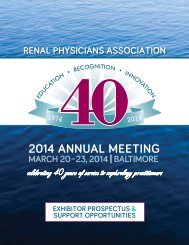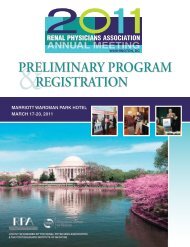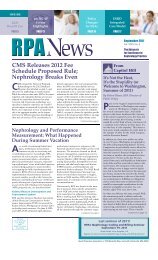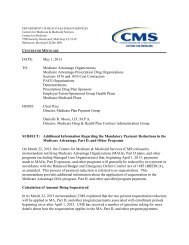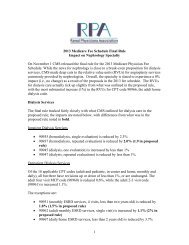The RPA Health Policy Handbook - Renal Physicians Association
The RPA Health Policy Handbook - Renal Physicians Association
The RPA Health Policy Handbook - Renal Physicians Association
Create successful ePaper yourself
Turn your PDF publications into a flip-book with our unique Google optimized e-Paper software.
T H e a D V o C a T e f o R e X C e l l e n C e I n n e P H R o l o G Y P R a C T I C e<br />
c■ It is always a good idea to follow up a phone call with a written thank you letter to<br />
the member and personally identify the staff member you spoke with, complimenting<br />
the staff member if the interaction was positive.<br />
4. Face-to-Face Meetings – person-to-person visits are the most effective way of letting<br />
a public official know about you, your issues, and the <strong>RPA</strong>. Given a legislator’s busy<br />
schedule, meetings are sometimes difficult to arrange; however, members will<br />
typically do what they can to meet with their constituents. When their schedule will<br />
not allow it, members will arrange for their appropriate staff member to meet with<br />
constituents in their place. Do not pass up the opportunity to meet with congressional<br />
staff. As discussed in Chapter 3, congressional staffers can have significant influence<br />
over the course and content of legislation. <strong>RPA</strong> members are encouraged to maintain<br />
ongoing contacts with these individuals.<br />
c■ In Washington, DC – Since legislators spend the majority of their time in<br />
Washington, DC, visiting their DC offices is always a good idea. <strong>The</strong> first time<br />
you visit a legislator, it is natural for you to feel a bit nervous, however, legislators<br />
are almost always eager to win your support and are sincerely interested in their<br />
constituents’ views on legislation. It is important to remember that you are the<br />
expert on the subject – you have the information that the legislator needs. Below<br />
are some strategies to help.<br />
n■ It is important to make an appointment as early as possible.<br />
n■ When scheduling a meeting, fax or email a letter to the member’s scheduler<br />
noting the specific day you will be in Washington, DC and what you would<br />
like to discuss.<br />
n■ Do not turn down the opportunity to meet with a staff member. Some staff<br />
members wield considerable power, and often are able to give more time and<br />
attention to issues than legislators can allocate.<br />
n■ During the visit, offer yourself as a resource.<br />
n■ If possible, invite a patient to accompany you. Do not underestimate the value<br />
of aligning with kidney patients, a much larger constituency than nephrology<br />
practices.<br />
c■ In your Congressional District/State – Do not overlook the opportunity to meet<br />
with your representatives when they are in their district or state. Many attempt to<br />
be in their districts each weekend and Congress generally recesses for a week<br />
around major holidays to grant members more time in their districts. Legislators<br />
tend to have more time available and fewer distractions when they are in the<br />
district. To arrange a district meeting, contact the member’s local office.<br />
■<br />
c In your Office/Facility – <strong>The</strong> most effective way to deliver your message to your<br />
members of Congress is to schedule a visit to your medical practice or local<br />
dialysis facility. You represent a community service, a place where many of their<br />
constituents receive care, and a place where voters work. Let your representative<br />
health policy handbook for nephrology practitioners<br />
CHaPTeR 4<br />
13





